Tripoli hit by a second day of militia in-fighting
By Ashraf Abdul Wahab, Ahmed Elumami and Reem Tombokti
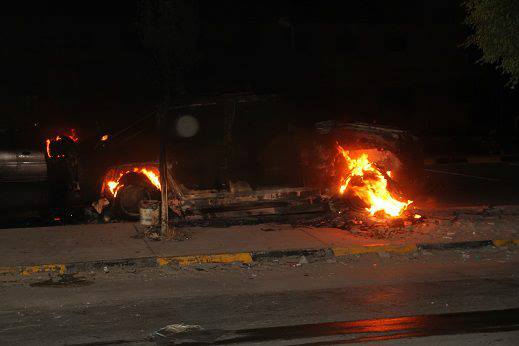
Blazing debris this evening in Abu Saleem
Tripoli, 26 June 2013:
For the second day running, violence returned today to Tripoli with confused fighting between rival groups in and around the Abu Saleem district which left at least two people dead, including a young bystander and around two dozen people injured.
The renewed fighting was between brigades nominally under the control of the Interior Ministry and other units supposedly taking their orders from the Ministry of Defence and by extension the armed forces.
Nevertheless the violence prompted an angry denunciation from the Acting Chief of Staff Salem Gnaidi this evening in a radio statement. He warned that anyone carrying a weapon in the capital should be disarmed. However he went on to say that the army was not yet strong enough to disarm outside militias itself unaided and therefore called on local militias to assist it.
The government meanwhile issued a statement confirming GNC Resolution 27 demanding Tripoli be made free of all armed groups.
Details of the violence today remain sketchy but one part of the fighting involved the Abu Saleem Military Council, an SSC units which was attacked by a brigade, reported in some quarters to be associated with the Defence Ministry. A commander of the SSC formation, named as El-Kekli was reportedly injured and another man, identified only as Muaid died of a head wound.
The engagement which involved heavy calibre machine guns and RPGs raged for several hours and columns of smoke could be seen rising from the area. The nearby Airport Road was closed to traffic for some hours, One source said that part of the old Abu Saleem market housing carpet sellers had been destroyed and a nearby house seriously damaged Unconfirmed reports say that the attackers managed to free some prisoners held by the Abu Saleem Military Council.
A second fire-fight , which broke out at around the same time this afternoon is believed to have been a continuation of Wednesday’s armed clash in the Salahaddin district, between the Petroleum Facilities Guards and Zintani militiamen. At one point, witnesses claimed to have seen at least one tank being deployed by the Zintanis.
With additional reporting from Aimen Eljali.
Members of Zawia Martyrs Brigade killed in Sirte ambush
By Nihal Zaroug.
Tripoli, 25 June 2013:
Six members of the Libyan Zawia Martyrs Brigade manning the Khasum Al-Khail checkpoint south of the town of Sirte, have died after being ambushed by unidentified gunman early this morning.
The leader of the brigade, Colonel Salah Abukhaliqah, is reported by the Libyens news portal as stating that the bodies had been mutilated post-mortem and that the perpetrators were “bearded”. The colonel disclosed that three military vehicles were also burned. Investigations are underway by the military prosecutor and a search of the surrounding area for the attackers was mounted immediately, said the colonel.
The attack, which occurred at dawn, has claimed the lives of Mouftah Ali, Ali Milad, Suleiman Albulaazi, Abubaker Mousa, Salah Al Sharidi, Salem Saddek, as reported by both Libyens and Press Solidarity news agency.
Earlier this month, Abukhaliqah had denied reports that his brigade had attacked members of the Sixth Infantry Battalion of the Libyan Shield passing through Kira at the Brak checkpoint, guarded by his men. The attack led to the eventual death of the head of the battalion, Colonel Salah Omar, and at least two others.
In an interview with Xinhua news agency, Abukhaliqah claims that after passing through the checkpoint, the convoy was ambushed and four men were wounded. Abukhaliqah says his men were part of the rescue efforts and not the attackers.
The convoy was ferrying military vehicles to Sebha after receiving them from the Ministry of Defence in Tripoli. At the Brak checkpoint, the convoy was delayed and documentation was requested by the Zawia Martyrs brigade, which is believed to have caused an angry stand-off between the two sides.
The attack and the government’s silence was condemned by Sheikh Sadeg Al-Ghariani.
With input from Ayman Amzeid
Petroleum Facilities Guards clash in Tripoli’s Salahaddin area
By Nihal Zaroug.
Tripoli, 25 June 2013:
An armed clash at the headquarters of the Petroleum Facilities Guards (PFG) in Tripoli’s Salahaddin district today has resulted in the injury of six people, three of them bystanders. One of bystanders needed surgery and remains in critical condition.
According to the official Facebook of the PFGs, at precisely 12:15, a heavily armed Zintani unit tasked with guarding the Sharara Oil field in the south of Libya, attacked the headquarters causing damage to the building and wounding three of its guards, one of whom was seriously wounded. The unit used neighbouring buildings to mount its “indiscriminate” assault, resulting in significant damage in the area.
Despite efforts by the authorities to negotiate with the attackers and ease the tension, a clash ensued and was only brought to an end by the arrival of Special Forces, who pursued the assailants when they fled the scene.
The PFG falls under the remit of the Ministry of Defense and back up was sent to assist the guards.
An PFG employee told the Libya Herald that an investigation would take place and action against the attackers would be taken. This was confirmed by an statement posted on the PFG’s English Facebook page, which read: “The PFG will not tolerate any such criminal acts and intends to take strict disciplinary actions against any whom wish to disturb law, order, security and endanger the lives of civilians.”
According the the Solidarity news agency, it was informed by anonymous sources that the violence was in protest over unpaid salaries for securing oil facilities in the south. Other reports claim the attack was over drilling equipment removed from the Sharara oil field.
Calm was not restored once the assailants fled. A resident of the area told theLibya Herald that a second, unrelated clash occurred at around 15:00 in which armed residents of the Hay Al-Zohoor area in Salahaddin district attacked the offices of the Mohamed Al-Madani Brigade, housed in the same street as the PFG headquarters. The residents were protesting against the presence of the brigade but the attack only resulted in further chaos, the complete closure of the Salahaddin area and increased tension.
Prison chief murdered in Tripoli
By Ashraf Abdul Wahab.
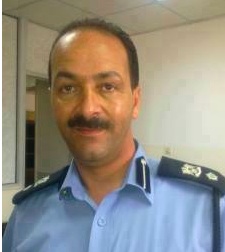
Wissam Ismail Smeida
Tripoli, 25 June 2013:
The head of Al-Ruiymi prison in Ain Zara, was assassinated this morning.
Wissam Ismail Smeida was one of the men who, late during the revolution, attempted but failed to kill Qaddafi’s intelligence chief Abdullah Senussi and other members of the regime who were taking refuge at the unfinished Four Points Sheraton Hotel in Hay Al-Andalous
Smeida, who had been head of the Capital Martyrs’ Brigade, was attacked today outside his home near the prison. His assassins are unknown, but it is thought they may be linked to one of the prison immates.
Senussi’s daughter Anoud is being held at women’s section of the prison.
Three Sebha car bombs slay two and injure 16
By Ahmed Elumami and Reem Tombokti
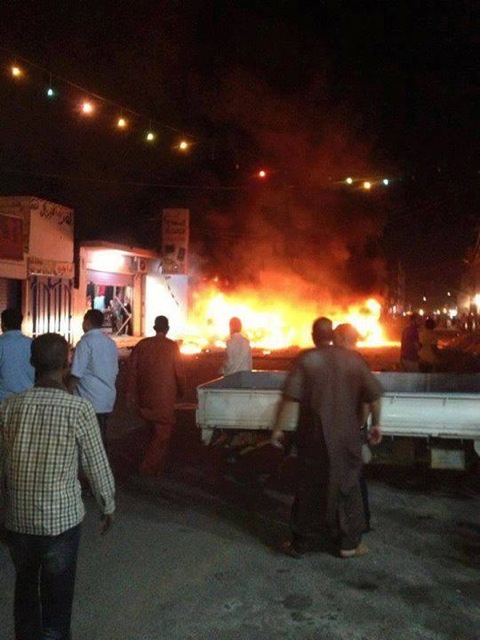
Horrified bystanders after the Qurtba district car bomb
Tripoli, 26 June 2013:
There was shock and anger this evening in Sebha following the explosion of three car bombs in the city, which left two dead and 18 injured.
The first blast happened outside the popular Mahmoud Khalil Café in the Agaid district at precisely 8.30 pm. The second explosion, around half an hour later, was in front of the Fezzan Hotel. The bombers then struck a third time, and most devastatingly, shortly afterwards, when a vehicle exploded in a shopping area in the Qurtba district of the city. It was in this last blast that two people died and extensive damage was caused to surrounding property.
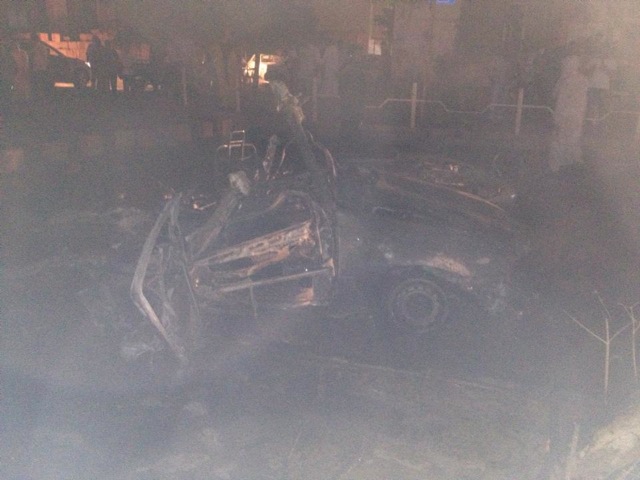
The mangled wreckage of one of the car bombs
In the early days of the Revolution, the Mahmoud Khalil Café was a popular gathering point for protestors against the Qaddafi regime.
This is the first time that Sebha has been exposed to car bombings. Security in the city is currently handled by a Supreme Security Council unit, supported by a Backing Team. There is at present no clue as to the identity of the bombers, nor the quantity of explosives used in the attacks.
Another senior officer murdered in Benghazi
By Maha Ellawati and Ahmed Elumami.
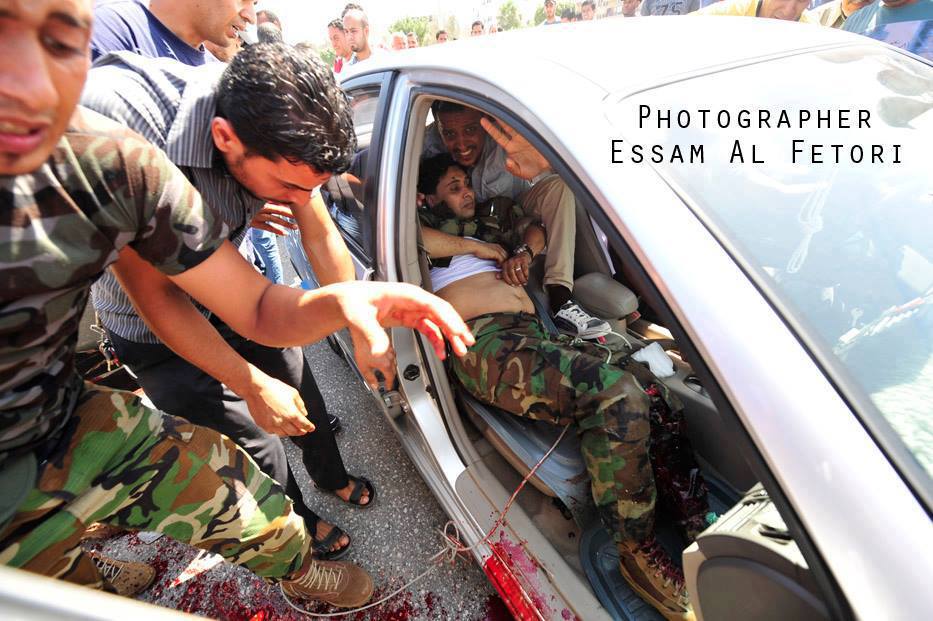
Col Hejazi being treated in his bombed vehicle (Photo: Essam Al Fetori)
Benghazi and Tripoli, 26 June 2013:
A colonel in military intelligence serving in Benghazi was killed by a car bomb this morning.
Col Jumaa Musrati’s car exploded near the Dubai Street roundabout in the Al-Majouri district. He was taken to the city’s Medical Centre with severe leg injuries and died shortly thereafter.
The spokesman for the Benghazi Joint Security Room Mohamed Hejazi told the Libya Herald: “We believe a bomb was put under the seat in Musrati’s car. It exploded at 10.15 am and he lost both legs in the blast”.
Hejazi said that security forces reacted rapidly and began a search for the bombers. At the moment their identity is unclear.
Musrati’s death is only the latest in a succession of murders of military personnel since the revolution. Some of the victims had served or were connected with the Qaddafi regime.
Few arrests have been made for these attacks and no prosecutions have been brought. Some suspect that many of the killings have been revenge attacks on figures from the old regime, while other believe the killers are Qaddafi regime supporters who are, as they see it, punishing individuals who chose to change sides and serve the February Revolution.
Earlier this year in the run-up to the second anniversary of the start of the Revolution, the GNC and the government established the Benghazi Joint Security Room, in which Hejazi worked, to tighten security and bring an end to the campaign of assassinations.
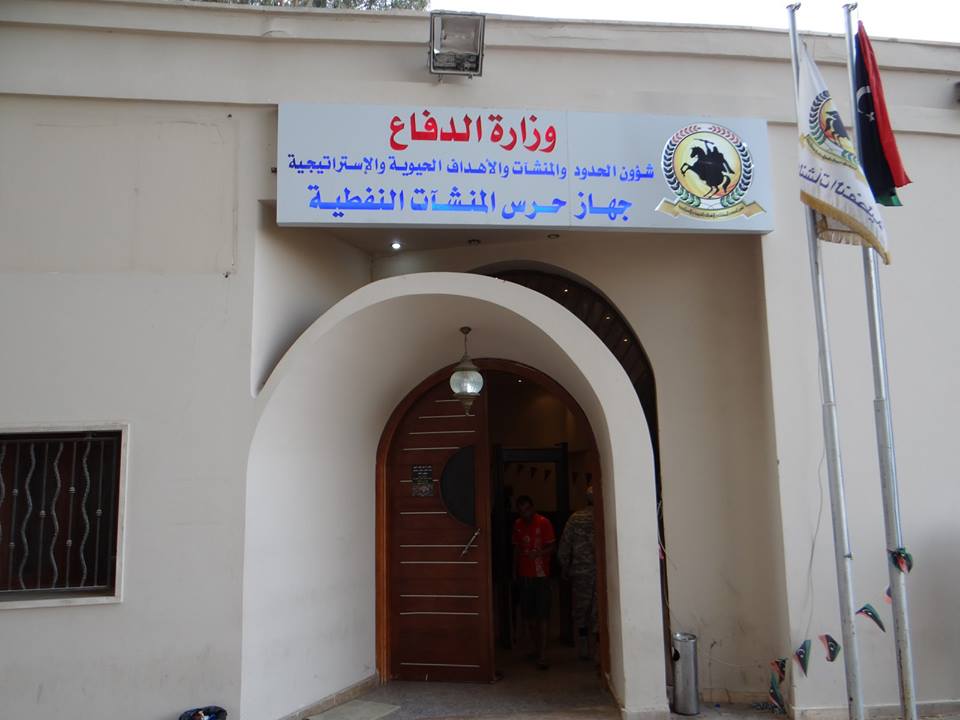
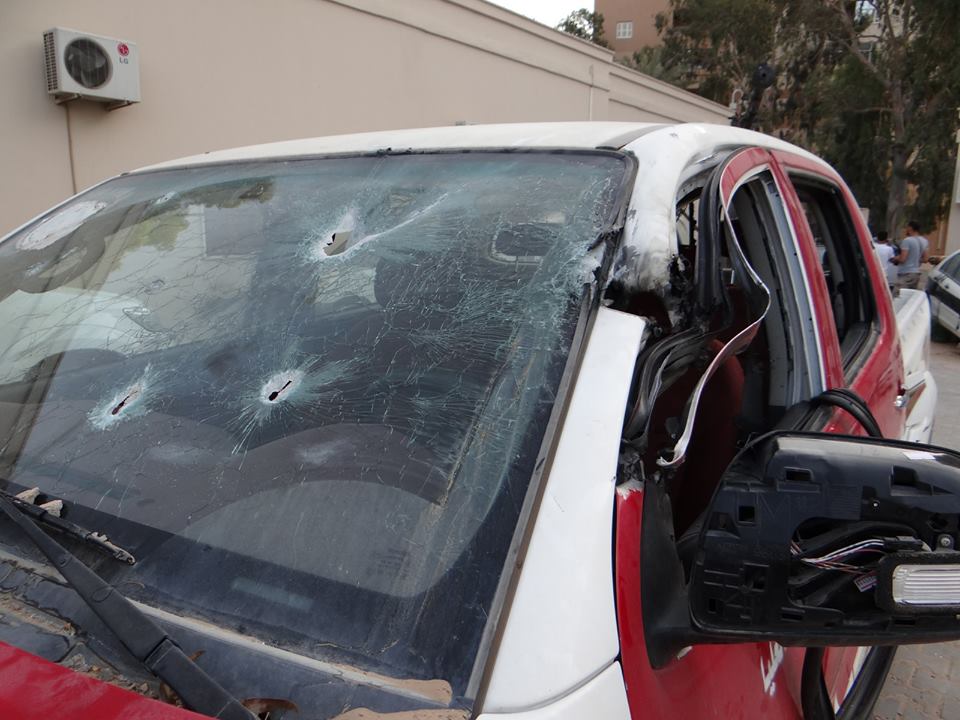
No comments:
Post a Comment